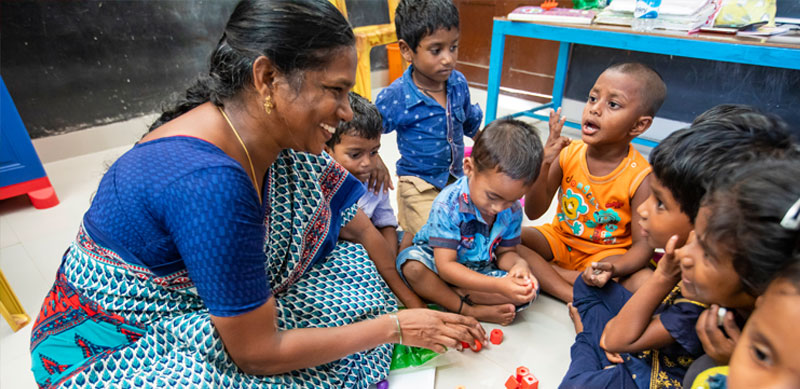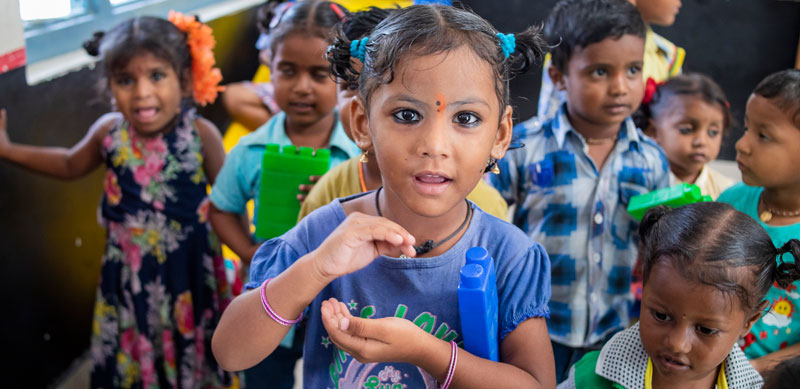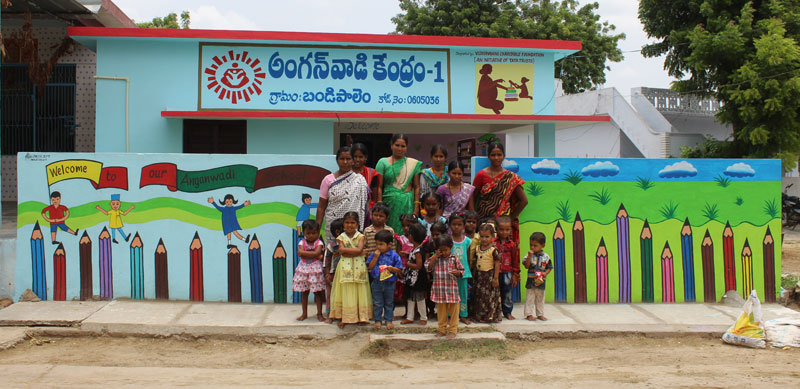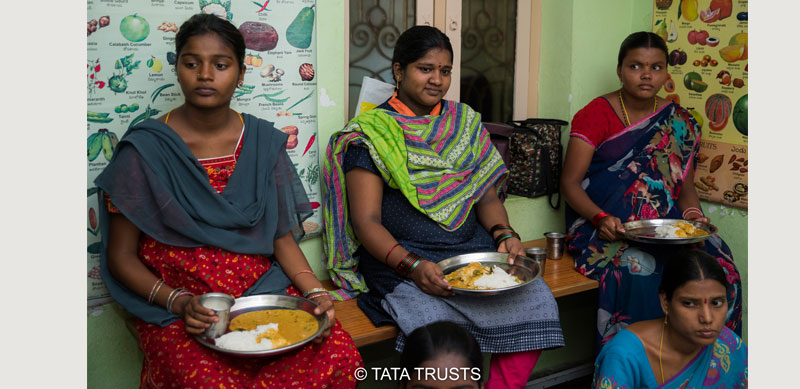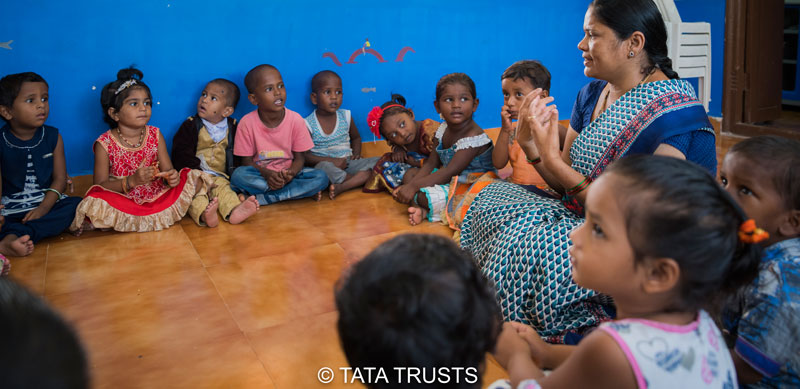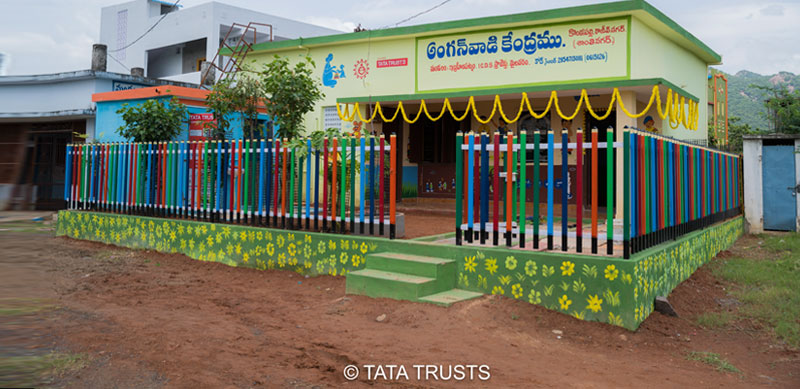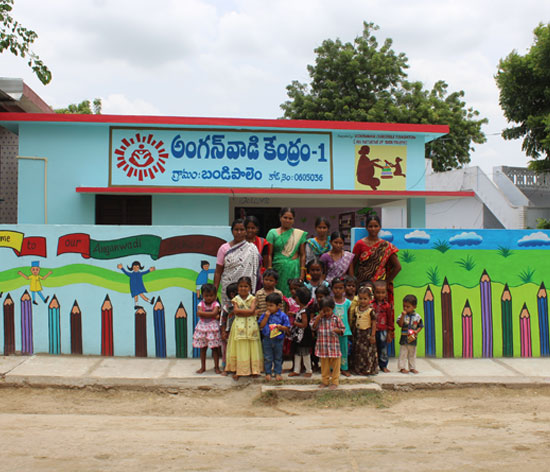
It makes me happy to see the anganwadi come to life again as a place of nurturing learning and bonding,” says Mrs Neeraja, who teaches at the anganwadi in Kanchikacherla village, Krishna district, Andhra Pradesh. The refurbished classroom belies the general perception of an anganwadi – crumbling walls, minimal infrastructure, missing functionaries, etc. This colourful anganwadi is among the 250 such anganwadis that today dot the otherwise bleak landscapes of Krishna, Guntur and Nellore districts in Andhra Pradesh. These refurbished anganwadis are a result of the Tata Trusts’ Making It Happen programme, aimed at realising the potential of the Integrated Child Development Services (ICDS) to transform the lives of mothers and children.
The Tata Trusts and The India Nutrition Initiative (TINI) have extended their support to the Government of India as well as the states, to implement nutrition-related initiatives targeted at building a robust ICDS system which can arrest malnutrition and under-nutrition. Restructuring and strengthening ICDS services is one of the Trusts’ highest priorities.
In Andhra Pradesh, the state is committed to improving the nutritional status of women and children. The memorandum of understanding signed by the Government of Andhra Pradesh, the Tata Trusts, TINI and the Vijayvahini Charitable Foundation (VCF, an associate organisation of Tata Trusts) focuses on improving the quality of life through an integrated multi-thematic approach. The idea is to catalyse action through the existing ICDS services in the state, the focal point of which is the anganwadi.
Implemented by VCF on behalf of the Trusts, government-owned anganwadis in the three districts of Andhra Pradesh have been completely transformed. Minor civil works, provision of basic furniture, IEC materials and pre-school education kits, playgrounds with play equipment, construction of child-friendly toilets, water filters for safe drinking water, the development of nutri-gardens, etc., are some of the many improvements that encourage learning, promote hygiene, and help provide good, nutritious food.
In addition, the anganwadis’ walls have been painted with a variety of themes – diet and nutrition for pregnant mothers, early education tools such as alphabets and numbers, pictures of fruits and vegetables, etc. Mrs Neerja is clearly a fan. “These paintings have made our job easier,” she says. “Pregnant and lactating women can easily follow the instructions depicted pictorially on the walls.”
The refurbishment of these anganwadis has helped to provide an enabling environment for the beneficiaries and enhanced joyful learning in the children. The aim is to increase enrolment and attendance, improved hygiene practices and improvement in the retention of mothers and children in these anganwadis. Nearly 1.46 lakh lactating and pregnant women and 3.26 lakh children under 6 have been beneficiaries of this project, across the three districts.
Alongside, the Trusts focused on improving and upgrading the skills of ICDS functionaries through various hands-on training and capacity building in nutrition and its components by visiting anganwadi centres and attending block-level meetings in Krishna district. These training sessions created a visible impact in terms of nutrition education for anganwadi workers to train and educate mothers on the concept of feeding and weighing their children. These trained workers will then become ToTs who educate the community, thus increasing the reach of these ICDS services.
The Trusts also monitored the ICDS System Strengthening and Nutrition Improvement Programme (ISSNIP) in these three districts. The main aim of the ILA training under this programme is to systematically train and motivate frontline workers – ASHAs, ANMs and anganwadi workers to build their capacity. The results have been impressive. The 21-module training has benefited 11,991 anganwadi workers, 500 supervisors and 59 block coordinators.
Mobilising and engaging key influences are a critical aspect of establishing sustainable ecosystems for ICDS services. The Trusts have always advocated effective community involvement and participation to utilise ICDS and other government-related services to eliminate malnutrition and to spread the message of optimal nutrition practices. The Trusts and VCF, in collaboration with the Department of Women Development and Child Welfare, Government of Andhra Pradesh, organised a number of events to reinforce important messages about the importance of breastfeeding, maternal and infant nutrition, 1,000 days’ care, nutritious food, etc. Nearly 300 community-based events and contact drives have sensitised 9000 people to optimal nutrition practices while another 1,400 women have been impacted through village organisations.
By adopting a multi-faceted approach to nutritional security, and working with stakeholders across Andhra Pradesh’s food and health ecosystem, the Trusts and TINI are working towards achieving a sustainable nutrition ecosystem across the state that will have a large-scale sustainable impact on its most vulnerable populations.
